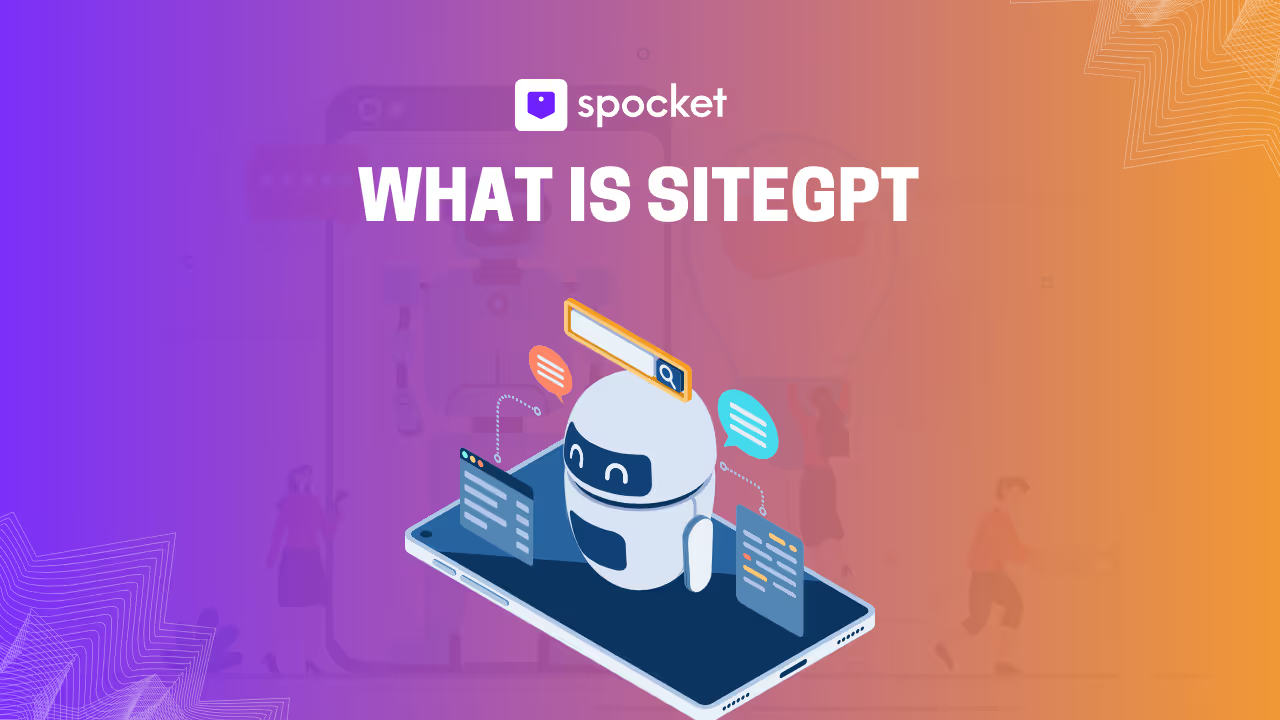What is SiteGPT?
Discover SiteGPT, the AI chatbot for websites that enhances user engagement, answers customer questions, and streamlines support. Perfect for e-commerce, blogs, and more!


SiteGPT is an advanced AI chatbot solution tailored for businesses looking to enhance their customer support services. Using cutting-edge natural language processing (NLP) technology, SiteGPT allows enterprises to automate responses to customer inquiries effectively. It can understand and generate human-like text, making interactions natural and engaging.
This tool is increasingly popular among companies that aim to provide 24/7 customer support while reducing operational costs. With the rise of e-commerce and online platforms like Spocket, businesses must respond swiftly to customer queries.

SiteGPT bridges the gap by offering quick, reliable, and informative responses. This guide will discuss everything you need to know about SiteGPT, what’s coming up soon, and more.
What is SiteGPT?
SiteGPT is an advanced chatbot solution designed to provide automated customer support. It integrates seamlessly into websites, allowing businesses to offer instant responses to customer inquiries. Unlike traditional chatbots, SiteGPT employs sophisticated natural language processing (NLP) techniques, enabling it to understand and respond to customer questions in a more human-like manner.
SiteGPT’s Technical Foundation: Behind the Scenes of Generative AI
SiteGPT’s power lies in its foundation on Generative AI in business, a subset of artificial intelligence focused on creating content rather than simply processing input. This technology's core is its model architecture—typically a large language model (LLM) such as GPT (Generative Pre-trained Transformer)—that’s pre-trained on vast amounts of text data. This pre-training allows SiteGPT to understand linguistic patterns, predict responses, and generate relevant answers on the fly without requiring manual updates for new queries.

The training process is what makes SiteGPT unique among customer support solutions. Unlike chatbots that follow rigid, rule-based responses, SiteGPT generates responses based on context, creating a more dynamic, engaging conversation. Its ability to “learn” from new inputs allows SiteGPT to handle complex, open-ended questions that would otherwise overwhelm traditional bots.
Natural Language Processing (NLP) in SiteGPT
SiteGPT employs advanced NLP techniques to understand and process user input. NLP enables SiteGPT to “read” questions, “infer” intent, and craft responses that feel coherent and human-like. This capability allows SiteGPT to distinguish between subtle differences in phrasing or context, recognizing that “What’s the status of my order?” and “Where’s my package?” might lead to an order status update.
Key Benefits of SiteGPT in Business Contexts
Here are the key benefits of SiteGPT for businesses:
Reducing Customer Support Costs
By automating common support inquiries, SiteGPT can significantly reduce the burden on customer service teams. The cost savings here can be substantial, especially for small to medium-sized businesses (SMBs) that need more resources for a large support team. With SiteGPT, these businesses can maintain high-quality service with limited personnel, freeing up employees to focus on complex cases or other areas.
Enhancing Customer Retention and Loyalty
In today’s digital-first marketplace, customer retention is paramount. Shoppers or clients who feel heard and quickly attended to are more likely to return, and SiteGPT’s instant response capabilities help achieve this goal. By providing timely answers, SiteGPT reduces the frustration resulting from long hold times, improving the likelihood of repeat engagement.
Scaling Customer Interactions
For growing businesses, scaling customer support can be challenging. SiteGPT enables companies to handle increased interaction volume without the logistical and financial burden of hiring and training new staff. Whether a business experiences seasonal spikes in traffic or a steady upward trend, SiteGPT can handle the load.
Real-World Applications of SiteGPT in Different Industries
Here are some real-world use cases of SiteGPT across different industries:
E-commerce
In the e-commerce sector, SiteGPT has numerous applications, ranging from assisting with purchase decisions to processing return requests. Imagine a customer shopping for electronics; they might have specific questions about compatibility, specifications, or delivery times. SiteGPT can field these questions instantaneously, increasing the likelihood of a conversion and revenue. Additionally, it can assist with tracking orders, issuing refunds, and managing inquiries about return policies. It’s great for launching a dropshipping business and you can use it along with your store integrations.
Healthcare
Healthcare providers must meet high customer service expectations, as patient experience often ties directly to perceived care quality. SiteGPT can be adapted to answer non-clinical questions regarding appointments, office hours, and insurance and provide general information about health services offered. This function is crucial, as it allows healthcare providers to maintain a high level of patient interaction without compromising medical staff resources.
Education
Educational institutions use SiteGPT to streamline administrative support for students and parents. SiteGPT can answer questions about course offerings, tuition, enrollment deadlines, and campus facilities. It can also help onboard new students by guiding them through the registration process or providing information on finances Thus, universities and schools offer improved accessibility to students without overloading administrative teams.
Travel and Hospitality
SiteGPT is a natural fit for providing immediate customer support in the travel industry. From helping users choose travel destinations to providing booking confirmations, SiteGPT acts as a virtual travel assistant. Travelers can ask questions about flight details, hotel amenities, and even visa requirements, receiving instant answers that help streamline the booking process.
SiteGPT’s Adaptability and Customization
SiteGPT’s customizable design makes it adaptable to various industries and specific business needs. Its interface allows businesses to control the chatbot's language, tone, and type of responses, ensuring that SiteGPT aligns with the company’s brand voice and style. For businesses with specialized terminology or frequently asked questions, SiteGPT can be pre-configured with these specifics to ensure it understands unique industry jargon.
Multi-Language Support
SiteGPT’s multi-language capabilities broaden its appeal to global companies. By responding to customers in their native language, SiteGPT can enhance international customer experience and accessibility, building trust across language barriers. This feature is especially beneficial in travel, e-commerce, and customer service industries, where companies often have a diverse client base.
Analytical Insights
Beyond answering customer queries, SiteGPT provides invaluable data through analytics. This data allows businesses to track engagement metrics such as response times, satisfaction rates, and common questions. With this insight, companies can identify recurring customer concerns, optimize content on their website, and continuously improve SiteGPT’s performance.
Privacy and Security
Privacy and data security remain top concerns for companies implementing AI solutions. SiteGPT is designed with robust security measures that include data encryption, secure cloud hosting, and adherence to data protection laws such as GDPR. By protecting sensitive information, SiteGPT ensures that customer data remains confidential and secure, fostering user trust and aligning with compliance regulations.
Latest Improvements to SiteGPT
SiteGPT frequently rolls out updates to improve its efficiency and adaptability. Recent enhancements include:
- Customizable Response Styles: SiteGPT now allows for tailored conversational tones, whether formal for finance or casual for lifestyle brands. This feature ensures interactions align with brand voice.
- Enhanced Analytics Dashboard: SiteGPT's upgraded analytics give businesses access to richer insights, allowing them to monitor customer interactions, track query types, and fine-tune responses based on real-world data.
- Expanded Multilingual Support: SiteGPT’s recent language update helps businesses cater to diverse audiences, making it a flexible choice for companies with an international customer base.
SiteGPT Pricing Overview
SiteGPT offers flexible pricing tiers to suit businesses of different sizes.

- Essential Plan: Ideal for startups and small businesses with modest customer service needs. It’s a starter plan with only 1 chatbot for use.
- Growth Plan: Designed for growing businesses, adding advanced analytics and customization options. You can use up to 2 chatbots with this.
- Pro Plan: It’s perfect for small and medium businesses that are gaining momentum. You can create up to 5 chatbots and multiple webpages and documents.
- Elite Plan: Best suited for large businesses, offering enhanced features like priority support and tailored integrations. You can create unlimited chatbots.
SiteGPT’s Role in Building Customer Trust and Transparency
SiteGPT can be used in the following ways to build customer trust and transparency:
Establishing Trust Through Consistent Information Delivery
One of SiteGPT's standout aspects is its ability to provide consistent, accurate information to users. In sectors like finance, healthcare, or education, where customer trust is paramount, SiteGPT ensures that every interaction delivers the same information. This consistency helps eliminate misunderstandings that might otherwise arise from interacting with different customer support agents with varying training or understanding levels. By maintaining a uniform, brand-aligned tone and information set, SiteGPT reinforces trust with each interaction.
Transparency in Information Use
SiteGPT’s structured data handling ensures that personal information remains protected and is only utilized for the specific purposes disclosed to users. When businesses leverage SiteGPT, they can make privacy policies more accessible and understandable, building customer confidence in their transparency practices. A finance company, for instance, could use SiteGPT to explain its data privacy policy to customers clearly, enhancing the user experience and boosting trustworthiness.
SiteGPT’s AI in Personalized Marketing
You can use SiteGPT AI for personalized marketing. Here are different ways to do that:
Understanding Customer Behavior Patterns
SiteGPT can analyze and interpret recurring customer queries, interactions, and preferences. This data helps businesses adapt their offerings and target customers with tailored messages. Suppose a fashion retailer notices that customers often inquire about sustainable materials. SiteGPT can identify this trend and suggest eco-friendly products, adjusting the messaging to meet user expectations.
Dynamic Upselling and Cross-Selling
SiteGPT goes beyond simple customer service by identifying opportunities for upselling and cross-selling based on real-time context. If a customer asks about a product that pairs well with others, SiteGPT can directly recommend complementary products or services in the conversation. For instance, a tech company selling computers and accessories can use SiteGPT to suggest compatible keyboards, software, or upgrades during the customer’s inquiry.
Enhancing Employee Efficiency Beyond Customer Service
SiteGPT can also be used to improve employee productivity. Here’s how:
Reducing Time on Routine Internal Queries
SiteGPT can act as an internal resource for companies, answering common questions from employees related to HR, company policies, IT support, and more. Instead of having employees spend time waiting for responses from various departments, they can quickly access information via SiteGPT, leading to increased productivity. Imagine a mid-sized company where employees frequently inquire about HR policies, company benefits, or IT troubleshooting tips; SiteGPT can handle these inquiries, freeing up HR and IT teams to focus on more complex tasks.
Supporting Training and Onboarding
SiteGPT is a knowledge hub for new employees, offering instant answers to common onboarding questions. SiteGPT can drastically reduce the resources spent on onboarding by streamlining the Q&A process for a business with a substantial workforce or a high employee turnover rate. For example, a customer service company with a steady influx of new hires could integrate SiteGPT to answer questions about workflow tools, performance benchmarks, or general procedures, reducing the burden on HR and training teams.
SiteGPT for Event-Based Businesses: Enhancing Guest Experiences
Event-based businesses like concert venues, sports arenas, or convention centers often face a high volume of customer inquiries leading up to an event. SiteGPT can handle questions related to ticket purchases, venue details, and timing, helping reduce the burden on customer support teams. Suppose a music festival is gearing up for an annual event; SiteGPT can provide information on schedules, artist lineups, and ticket tiers to enhance the customer’s journey and streamline pre-event engagement.
During live events, timely information is critical for attendee satisfaction. SiteGPT can handle real-time queries on event schedules, rest areas, food options, and more. An example is a stadium using SiteGPT to answer common attendees' questions regarding parking, nearby restaurants, or event times, keeping attendees informed and minimizing frustration.
SiteGPT’s Role in the Retail Experience
Retailers can use SiteGPT to bridge the gap between online and in-store experiences by embedding QR codes around their stores. When customers scan these codes, they can interact with SiteGPT for product details, reviews, and availability information. For example, a customer might scan a code on a product display in a clothing store and be directed to SiteGPT, where they can ask about sizing, color options, or similar items. This use case adds a digital layer to the in-store experience, catering to tech-savvy shoppers who prefer instant, self-guided assistance.
Retailers often struggle with managing post-purchase queries, ranging from product use tips to returns and refunds. SiteGPT can streamline this process by guiding customers through common post-purchase concerns and troubleshooting tips. For instance, an electronics retailer could use SiteGPT to provide setup instructions or warranty details, enhancing customer satisfaction by reducing the need for live agent intervention.
SiteGPT as a Tool for Lead Generation and Nurturing
If you’re thinking about lead generation and nurturing, here’s how SiteGPT can help:
Interactive Lead Qualification
In industries that rely on gathering leads, SiteGPT can handle initial queries from potential customers, qualify leads based on responses, and forward them to the sales team. For example, a B2B company in the software sector can program SiteGPT to assess prospect needs, recommend the most relevant software package, and collect contact information for further follow-up, allowing the sales team to focus on high-quality leads.
Educational Content Sharing
SiteGPT can recommend blog posts, whitepapers, or case studies relevant to the customer’s needs, offering a subtle way to nurture leads. If a customer inquires about advanced features, SiteGPT can suggest a detailed whitepaper or video guide, enhancing the business’s credibility and keeping the prospect engaged.
Localization
SiteGPT can be customized to align with cultural norms, ensuring appropriate responses for different regions. This localization makes interactions feel more personalized, fostering positive relationships with international customers. For instance, a tourism company offering services in several countries could configure SiteGPT to respect local greetings, holidays, and cultural sensitivities, creating a more welcoming and relatable interaction.
SiteGPT’s Potential in Small and Medium-Sized Businesses (SMBs)
SMBs have a lot to look forward to:
Cost-Effective Customer Service Solutions
For SMBs with limited budgets, SiteGPT offers an affordable alternative to hiring and training a large customer service team. Its flexibility allows it to adapt to various industry needs, meaning SMBs can benefit from advanced customer service features without high overhead. An independent retail store, for example, can use SiteGPT to manage customer inquiries about product availability, return policies, or promotions without extensive staffing.
Scalability for Growing Businesses
As SMBs grow, their customer support demands often expand, too. SiteGPT provides a scalable solution that can grow alongside the business. When SMB experiences increased demand, SiteGPT can handle the additional load without requiring a proportional increase in staffing, making it an ideal solution for companies experiencing rapid growth phases.
Customer Sentiment Analysis
SiteGPT can analyze language patterns and detect sentiment in customer interactions, helping businesses gauge customer satisfaction levels. This insight allows brands to take proactive steps in addressing issues and improving experiences. An airline, for example, could use SiteGPT’s sentiment analysis to monitor customer frustration levels, identifying potential problem areas and addressing them before they impact the customer experience.
Actionable Customer Feedback
In addition to sentiment analysis, SiteGPT can prompt customers for feedback post-interaction. This data offers actionable insights for improving products, services, or support processes. A SaaS provider could use feedback collected by SiteGPT to refine its user interface, address common pain points, and roll out improvements based on real user experiences.
The Future of SiteGPT and Generative AI in Customer Support
Generative AI and chatbots are continuously evolving, and SiteGPT will likely see even more incredible advancements in the future. As models grow more sophisticated, SiteGPT may integrate deeper personalization features, allowing it to remember customer preferences and past interactions to further tailor responses. Additionally, SiteGPT’s continuous improvement will likely involve refining its ability to handle complex queries, particularly in industries requiring high specificity and compliance levels.
Advanced Machine Learning Models
As newer, more efficient machine learning models emerge, SiteGPT is expected to leverage these developments to boost its accuracy and reduce processing times. Machine learning advancements could also enable SiteGPT to generate more accurate responses when customer questions are highly technical or niche.
Cross-Platform Compatibility
The increasing popularity of messaging apps and social media means that future iterations of SiteGPT may focus on providing seamless support across platforms. This capability would allow customers to access support through various channels, from web chat to WhatsApp and social media platforms, without losing the continuity of the interaction.
AI Ethics and Human Oversight
As SiteGPT continues to develop, AI ethics and the role of human oversight will become more important. While SiteGPT can handle many queries, some customer interactions will still require a human touch. Future iterations may include features allowing seamless human intervention when needed, blending AI efficiency with human empathy.
Comparing SiteGPT with Other Chatbots
Let’s compare SiteGPT with other chatbots below.
Traditional Chatbots vs. SiteGPT
Traditional chatbots often rely on pre-programmed responses and can struggle with complex queries. In contrast, SiteGPT’s generative AI capabilities allow it to provide nuanced answers, leading to a more satisfying user experience.
SiteGPT vs. Other AI Solutions
While several AI-driven customer support tools are available, SiteGPT stands out for its flexibility and ease of integration. Other solutions may require extensive setup or technical expertise, making SiteGPT a more accessible option for businesses of all sizes.
Why SiteGPT Matters in a Digital-First World
The shift towards online customer engagement has brought new business challenges and opportunities. SiteGPT offers an essential bridge between digital efficiency and personal customer service in this landscape. By answering questions instantly, providing tailored responses, and enhancing the overall customer journey, SiteGPT helps companies cultivate strong, loyal customer relationships.
SiteGPT’s Role in Digital Transformation
Digital transformation is a priority for many businesses seeking to stay competitive, and AI chatbots like SiteGPT are pivotal in this process. By embracing SiteGPT, companies can modernize their customer support functions, optimizing how they interact with customers in a digital-first environment. This modernization often leads to better outcomes, such as increased efficiency, higher customer satisfaction, and the capacity to scale without sacrificing quality.
Embracing AI Responsibly
While AI’s potential is vast, responsible adoption is critical. SiteGPT’s design considers ethical AI practices, promoting transparency and minimizing biases in customer interactions. This approach helps ensure that AI is used as a tool for enhancement rather than replacement, maintaining a balance between efficiency and responsible use.
Conclusion
As businesses strive to enhance customer support, SiteGPT offers a compelling solution that balances functionality with user experience. Its generative AI capabilities provide nuanced, personalized responses, making it more than just a typical chatbot. By improving response times, lowering support costs, and offering around-the-clock service, SiteGPT empowers businesses to meet and exceed customer expectations.
For businesses considering SiteGPT, now is the ideal time to explore its features and potential benefits. With customizable options, robust analytics, and continuous improvement, SiteGPT represents a step toward the future of customer engagement—one where technology and human-centric service can thrive together.
Frequently Asked Questions
What is SiteGPT, and how does it work?
SiteGPT is a conversational AI tool that allows you to add a chatbot to your website. The chatbot uses AI to answer visitor questions by referencing your site’s content, making it more interactive and informative. By analyzing data from your website, it can help customers find information quickly and improve their overall experience.
Do I need coding skills to set up SiteGPT on my website?
No, you don’t need coding skills to use SiteGPT. It’s designed with a user-friendly interface that allows you to set up and configure your chatbot easily. Most installations involve copying and pasting a few lines of code, which SiteGPT provides.
What kind of websites can benefit from SiteGPT?
Any website with frequently asked questions, detailed products, or content-heavy pages can benefit from SiteGPT. This includes e-commerce sites, blogs, educational platforms, and service-based businesses. SiteGPT is especially useful for sites with high visitor engagement, as it streamlines customer support and content delivery.
Can SiteGPT answer complex questions from visitors?
Yes, SiteGPT can handle a range of questions. It’s powered by advanced AI technology that allows it to interpret and respond accurately to questions. However, the depth of its responses depends on the quality and relevance of the website’s content, which the AI uses to generate answers.
How secure is the data used by SiteGPT?
SiteGPT prioritizes data security. The AI only uses information from your website content to respond to visitor questions, ensuring sensitive data remains protected. Additionally, SiteGPT complies with industry-standard security practices to prevent unauthorized access.
Can I customize the responses generated by SiteGPT?
Yes, SiteGPT provides customization options for responses, allowing you to fine-tune the chatbot’s tone and content focus. You can also add specific phrases or answers to common questions, ensuring that responses match your brand’s voice and customer expectations.
Launch your dropshipping business now!
Start free trialRelated blogs

Is Gelato Legit? An In-Depth Review of Gelato Print on Demand
Is Gelato legit for print on demand sellers? Read this in-depth Gelato review covering pricing, quality, reviews, pros, cons, and whether it’s worth using in 2026.

Is FragranceX Legit? A Detailed Review for Safe Perfume Shopping Online
Is FragranceX legit for buying discounted perfume online? Learn about Trustpilot ratings, authenticity claims, pricing, shipping, returns, pros and cons, and safer buying tips.

How to Start a Faceless YouTube Channel (and Make Money From It)
Learn how to start a faceless YouTube channel step-by-step, pick profitable niches, create videos with AI, and monetize with ads, affiliates, and ecommerce using Spocket.

































